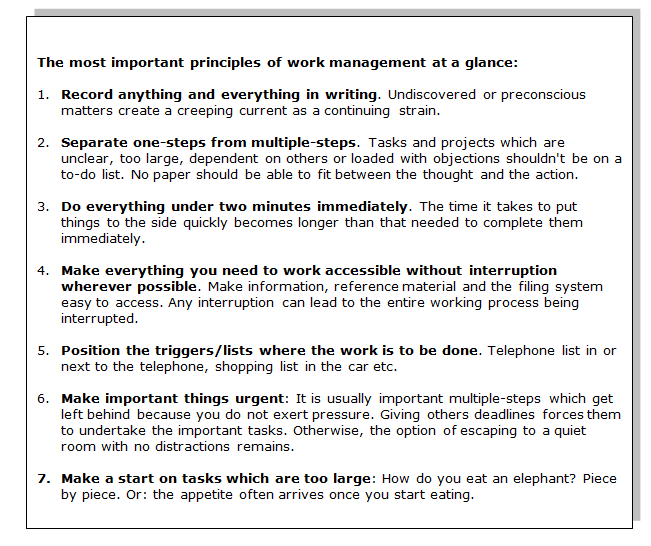Working with fun and success – who doesn’t want that?!
So what’s stopping us? It’s easy to find answers: I have the wrong tasks; I have the right tasks but the wrong means; if I have the means, I am lacking people or information without which I cannot go any further. When I have that, I still get knock-backs or something or others become difficult. Already, fun and success have turned into stress and shortcomings – shortcomings in time, in quality of communication and much more.
- Work and life
In the short term, I have to fulfil the obligations that I have taken on, whatever the reasons, pressure or coincidence that caused them. In the long term, the question about the right tasks is justified. It is a question about the right job, the right position and the right projects and tasks. In the medium term, the important question is: "Am I entering into the right obligations?" or do they include tasks which neither correspond to my goals and motivation nor have a prospect of success?
- Work and drivers
Our inner drivers are a source of too many tasks or the reason for the wrong tasks. They shout "here" in the wrong places and then don’t let us say "no" in others. Or they ruin our success because they tell us from inside that our own work was not good enough, not quick enough, not thorough enough. Drivers occur where work should be healing the ego and is being abused as a replacement for personal deficits. What is expected of me and what do I believe is expected of me? Am I setting the right expectations of myself?
- Work and state
Many try to allow themselves to be led by their own deadlines and priorities where the external forces of urgency are at work. Many do not achieve this, since a particular state is needed for many activities. Some work requires creativity, others resolution, a critical mind, enthusiasm, accuracy, overview, sorting according to similarities or differences, to name just a few states. How can I put myself in the right productive state?
- Work and distraction
The good thing about urgency, deadlines, direct requests, calls, meetings etc. is that all I have to do is react. I have no choice (if I only react, I am also only working towards the goals of others). The problem starts with the choice – there, I am no longer being led. The choice leads to questions: "I have so much to do, but where should I start?" From this point, my working "thread" is vulnerable to all forms of internal and external distraction.
We want to concentrate, to get into the "flow" state of working, but any small bump, any light sidewind can blow my thread off course and leave it in a corner, unsatisfied, brooding and doing nothing.
While the points named above are part of the area of action covered by work-life balance, career and professional consultancy and coaching, the area of rules, tricks and aids to work and time management starts here.
- Circular working
The preparation and maintenance of organisational means, collecting and allocating work processes.
- Vertical working
Dividing into and creating working steps which can be implemented (one-steps), planning, dealing with objections and interruptions of any kind.
- Horizontal working
Implementing specific individual steps of action.

Circular working(Regulating all points) |
Preparation of organisational material |
|
Collection/recording of all external sources: physical |
|
|
Collection/recording of all internal sources: psychological(clean-up inside head) |
|
|
Emptying and allocating inbox |
|
|
Vertical working(Transforming multiple-steps into one-steps) |
Tasks/projects too large, not manageable |
|
Tasks/projects unclear/not transparent/missing information |
|
|
Tasks/projects whose progress depends on others |
|
|
Tasks with objections/fears/worries |
|
|
Horizontal working(Completing one-steps) |
"Two-minuters" |
|
Scheduling |
|
|
Delegation |
|
|
Next steps |
|